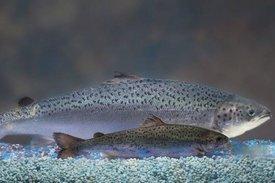The genetically modified fish can breed with trout and take over

A genetically modified salmon next to a much smaller non-genetically modified salmon of the same age. (AquaBounty Technologies , The Canadian Press)
By Jacob Chamberlain at CommonDreamsGenetically modified (GM) salmon could have a catastrophic impact on natural ecosystems if they are introduced into the wild, a team of scientists warned this week.
A genetically modified salmon next to a much smaller non-genetically modified salmon of the same age. (AquaBounty Technologies , The Canadian Press)The study, published Tuesday and conducted by scientists from Newfoundland’s Memorial University, shows for the first time that GM salmon would quickly become an invasive species if they bred with similar species such as the brown trout—a likely crossbreed that would wreak havoc for other fish.
The fish, which are genetically modified to grow faster than natural salmon, could escape from fish farms into a natural habitat.
Using a laboratory-simulated stream, the researchers raised GM Atlantic salmon, wild Atlantic salmon, wild brown trout and hybrids of GM salmon crossed with trout.
The researchers found that the crossbreed offspring of GM salmon with brown trout consumed food at a much faster rate than their parents and non-GM fish. This, combined with the unparallelled growth rate of the of GM offspring, would mean other species would not be able to compete for food.
Additionally, as the team of researchers pointed out, GM salmon are more likely to crossbreed with species other than non-GM salmon — meaning the hungry offspring would more than likely become pervasive.
The Montreal Gazette reports:
While cross-breeding between salmon and trout occurs infrequently in the wild — at a rate of only about one per cent — previous studies have found that when farmed salmon escape from hatcheries or fish farms into the wild, the rate increases to as high as 41 per cent, the researchers said.
“If this advantage is maintained in the wild, transgenic hybrids could detrimentally affect wild salmon populations, ” said researcher Krista Oke.
GM salmon are created by biotech firm AquaBounty and are currently under consideration for public sale by the US Food and Drug Administration. The fish would be the first GM animals to be approved for human consumption.

